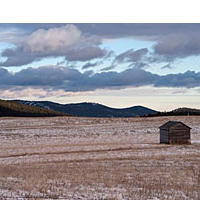Sioux Tribe Buys Back Sacred Land from Private Owners
 Pe' Sla (AP Photo, courtesy South Dakota Magazine, Bernie Hunhoff)
Pe' Sla (AP Photo, courtesy South Dakota Magazine, Bernie Hunhoff)
The Great Sioux Nation got its sacred land back, even though some tribal members weren’t happy about how it came about.
Earlier this year, the auctioning of nearly 2,000 acres in the Black Hills of South Dakota garnered national media attention after many Native Americans complained about the sale.
Known as Pe’ Sla, the land is considered sacred by the Sioux, who objected to the owners, Leonard and Margaret Reynolds, selling off the 1,942 acres to another private party.
The public outrage convinced the Reynolds to cancel the auction and sell the land back to the Sioux tribes for $9 million.
Many members of the Sioux tribes opposed paying for something that originally belonged to them. “It’s like someone stealing my car and I have to pay to get it back,” Tom Poor Bear, the vice president of the Oglala Lakota Tribe in South Dakota, told The New York Times.
The Black Hills were granted to the Sioux Nation under the Laramie Treaty of 1868. A few years later, prospectors began encroaching on the land after gold was discovered in the area.
The U.S. government seized the Black Hills in 1877 following battles between the Sioux and the American cavalry, including the infamous Battle of Greasy Grass (what the Sioux call Little Big Horn) where General George Custer and his men were killed.
-Noel Brinkerhoff
To Learn More:
Native American Tribes Successfully Buy Back Stolen Sacred Land (by Lauren McCauley, Common Dreams)
Sioux Racing to Find Millions to Buy Sacred Land in Black Hills (by Timothy Williams, New York Times)
Sioux Tribe Reaches Out on Internet to Raise Money to Buy Back Sacred Land (by Noel Brinkerhoff, AllGov)
- Top Stories
- Unusual News
- Where is the Money Going?
- Controversies
- U.S. and the World
- Appointments and Resignations
- Latest News
- Musk and Trump Fire Members of Congress
- Trump Calls for Violent Street Demonstrations Against Himself
- Trump Changes Name of Republican Party
- The 2024 Election By the Numbers
- Bashar al-Assad—The Fall of a Rabid AntiSemite






Comments